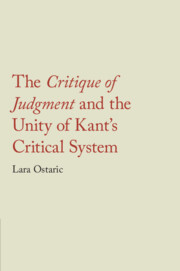Book contents
- The Critique of Judgment and the Unity of Kant’s Critical System
- The Critique of Judgment and the Unity of Kant’s Critical System
- Copyright page
- Contents
- Acknowledgments
- Note on Sources
- Kant’s Writings by Abbreviations Used for German Titles with Corresponding Translations
- Introduction
- Part I The Highest Good and the Postulates
- Part II Aesthetic Judgment and the “Moral Image”
- Chapter 4 Beauty as a “Symbol of Morality”
- Chapter 5 The Free Harmony of the Faculties and the Primacy of Imagination in Kant’s Aesthetic Judgment
- Chapter 6 Genius, Ugliness, and Nonsense
- Part III Teleological Judgment and the “Moral Image”
- Bibliography
- Index
Chapter 5 - The Free Harmony of the Faculties and the Primacy of Imagination in Kant’s Aesthetic Judgment
The “Moral Image” of the “Supersensible Within”
from Part II - Aesthetic Judgment and the “Moral Image”
Published online by Cambridge University Press: 15 August 2023
- The Critique of Judgment and the Unity of Kant’s Critical System
- The Critique of Judgment and the Unity of Kant’s Critical System
- Copyright page
- Contents
- Acknowledgments
- Note on Sources
- Kant’s Writings by Abbreviations Used for German Titles with Corresponding Translations
- Introduction
- Part I The Highest Good and the Postulates
- Part II Aesthetic Judgment and the “Moral Image”
- Chapter 4 Beauty as a “Symbol of Morality”
- Chapter 5 The Free Harmony of the Faculties and the Primacy of Imagination in Kant’s Aesthetic Judgment
- Chapter 6 Genius, Ugliness, and Nonsense
- Part III Teleological Judgment and the “Moral Image”
- Bibliography
- Index
Summary
This chapter demonstrates that fundamental to the free harmony of the faculties is reflection understood as “an action of the power of imagination” and not as “the logical actus of the understanding.” The imagination, following its own law, provides, as it were, a schema of a universal that goes over and above the formal conditions of the possibility of empirical cognition while still being consistent with the latter. The free harmony of the faculties in which neither faculty is determining nor determined by the other gives us license for an indirect or analogical exhibition of the “supersensible substrate” of freedom, or what I call is the supersensible “within,” that is, the soul. Pure aesthetic pleasure, therefore, helps us close the gap between our phenomenal and our supersensible nature insofar as it intimates a unifying supersensible ground of our phenomenal nature, of our different inclinations and their anticipated satisfactions.
Keywords
- Type
- Chapter
- Information
- The Critique of Judgment and the Unity of Kant's Critical System , pp. 123 - 149Publisher: Cambridge University PressPrint publication year: 2023

